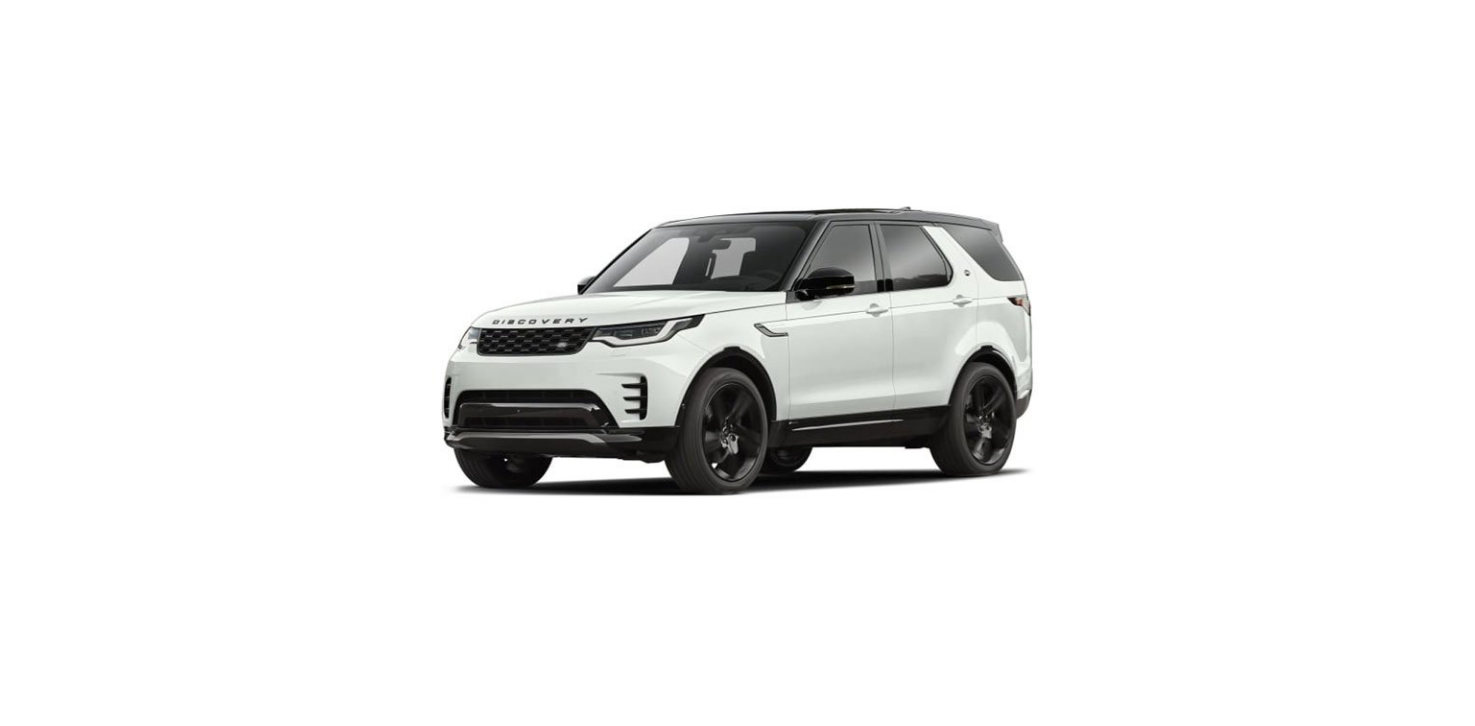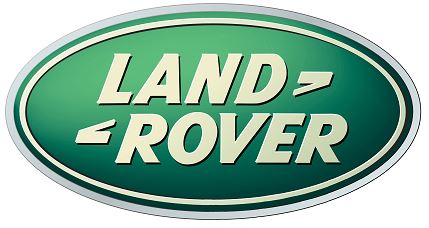
2022 Land Rover Discovery Storage Compartments
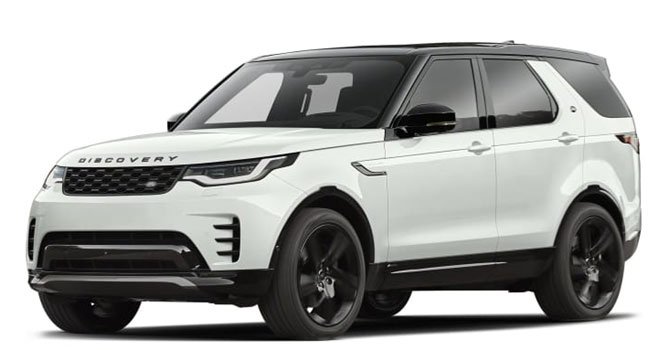
STORAGE COMPARTMENTS
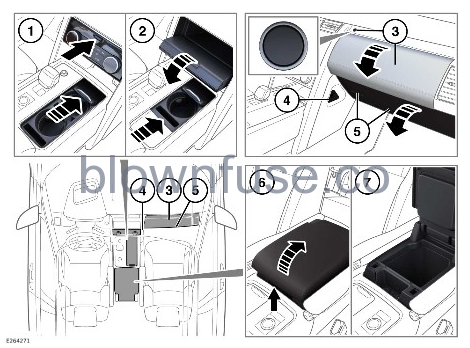
Make sure any items stored in the vehicle are secure and cannot move. If the vehicle is involved in an accident or is subject to sudden braking or a change of direction, loose items can cause serious injury.
Do not drink while driving. Driver distraction can lead to accidents, potentially causing serious injury or death.
Do not remove items from, or place items in, the cup holders while driving. Driver distraction can lead to accidents, potentially causing serious injury or death.
The cool box should be switched off when it is not needed, to preserve battery charge.
Front storage locations:
- Climate control panel: Press to release. Cupholder cover: Slide forwards to reveal cupholders.
- Access to storage behind the climate control panel. Access to storage behind cupholders.
- Upper glovebox: press the button to release the lid.
- Convenience hook.
- Lower glovebox: release the catch to open the glove box.
- Armrest: Release catch, then lift armrest upwards.
- Deep storage area: Lift the armrest to access the storage area.
The climate controls do not operate when the panel is open.
The storage compartment is located under the loadspace floor (not applicable on the commercial variant).
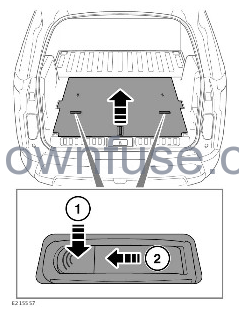
To access the storage compartment:
- Reposition the loadspace mat for access.
- Press both release buttons (1) in the location shown.
To close the storage compartment:
- Press the loadspace floor firmly into the closed position.
- Press both latches (2) to secure the loadspace floor.
All items carried in the vehicle should be properly secured. If the vehicle is involved in an accident or is subject to sudden braking or a change of direction, loose items can cause serious injury or death.
Storage is provided between the front seats.
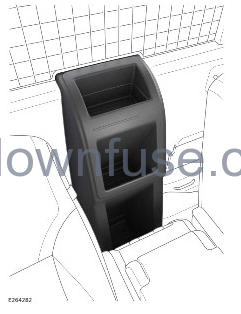
The storage compartment spans the full width of the vehicle. Access is gained from either rear door on each side of the vehicle.
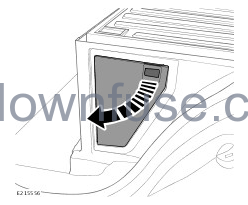
To access the storage compartment:
- Open either rear exterior door.
- Pull the storage compartment door handle downward.
AUXILIARY POWER SOCKETS
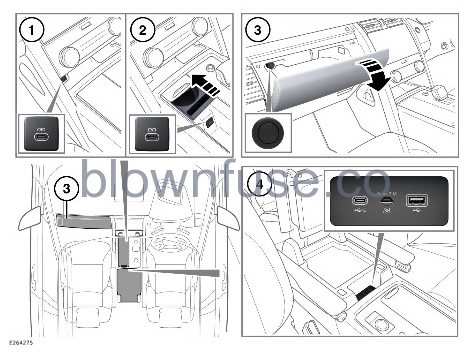
Only use approved accessories. Using any other equipment may damage the vehicle’s electrical system. If in any doubt, contact a retailer/authorized repairer.
Power sockets can be used to power approved accessories that use a maximum of 120 Watts.
The engine should be running when using accessories for long periods. Failure to do so can discharge the battery.
Front auxiliary power sockets:
- USB C power outlet below the climate control panel.
- USB C power outlet below the cup holder.
- 12v socket, located in the glove box.
- USB A, C, and nano SIM sockets in front of the armrest.
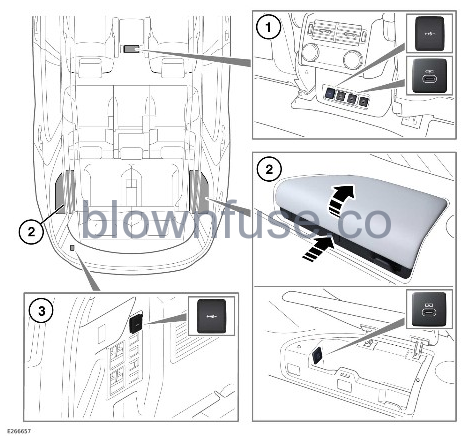
Rear auxiliary power sockets:
- Center console power sockets.
- Rear, side storage power sockets.
- Loadspace power socket.
WIRELESS CHARGER
Metallic objects may become hot if they are placed between the mobile device and the charging mat, which may result in serious injuries.
Do not place anything other than a Qi-compatible mobile device or accessory onto the charging mat. Items such as keys, key fobs, coins, jewelry, paper clips, or foil candy wrappers may interfere with the wireless charger’s operation.

The wireless charger is located on the center console, beneath the climate controls. See DRIVER CONTROLS. The wireless charger provides up to 15 Watts of power to charge Qi-compatible mobile devices.
To use the wireless charger:
- Switch on the vehicle’s ignition.
- Place the Qi-compatible mobile device in the center of the mat with the device’s screen facing upward. Align the long edge of the device with the longer edge of the wireless charging area. Charging commences after a short delay of up to 10 seconds.
Remove the mobile device from the wireless charger to stop the charging process.
The amount of charging current supplied and the time taken for charging is entirely under the control of the mobile device.
The wireless charger continues to charge during an engine stop/start event.
Aftermarket device cases or enclosures can reduce wireless charging efficiency, or block it altogether. If a Qi-compatible device exhibits problems charging wirelessly, remove any aftermarket cases or enclosures.
Removing the device from the wireless charging mat and replacing it will reset the connection.
Dynamic driving could cause the device to move around in the wireless charging area. This may cause the wireless charge process to disconnect briefly. Make sure the device remains flat on the wireless charging mat.
The wireless charger switches off automatically when the mobile device is fully charged.
The following icons appear on the touchscreen and relate to the wireless charging status:
Charging: Indicates a device is on the charging mat and recognized by the system.
Charged: Indicates the mobile device is fully charged.
Foreign object: Indicates a foreign object is detected on the charging mat. Occasionally, the wireless charging system may display this symbol while cooling down. Wireless charging will resume once the system’s temperature has normalized.
The wireless charger mat incorporates a phone signal booster. The phone signal booster is a cell phone signal enhancer, designed to compensate for reduced reception inside the vehicle’s interior. This phone signal booster operates by selectively boosting signals into and out of the cell phone via an external antenna. The phone signal booster operates automatically when a cell phone is placed on the charging mat; there is no need to connect or set up the phone signal booster.
E911 location information may not be provided or may be inaccurate for calls served when using this device.
This signal booster is a consumer device. Before use, you must register this device with your wireless provider and have your provider’s consent. Please contact your retailer to obtain the device’s serial number. Once obtained, contact your wireless service provider to register the phone signal booster.
You MUST cease operating this device immediately if requested by the FCC (USA) or ISED (Canada) or a licensed wireless service provider.
Canada only – Before use, you must meet all requirements set out in ISED CPC-2-1-05. See https://www.ic.gc.ca/eic/site/smt-gst.nsf/eng/sf08942.html for details. You must operate this device with approved antennas and cables as specified by the manufacturer. Antennas must not be installed within 8 in (20 cm) of any person.
The phone signal booster cannot enhance cell phone reception in areas where there is no signal available.
PHONE BOOSTER REGULATORY STATEMENT
Enhanced 911 (E911) location information may not be provided or may be inaccurate for calls served when using this device.
FCC/ISED Notice: This is a CONSUMER device. BEFORE USE, you MUST REGISTER THIS DEVICE with your wireless provider and have your provider´s consent. Most wireless providers consent to the use of signal boosters. Some providers may not consent to the use of this device on their network. If you are unsure, contact your provider.
In Canada, BEFORE USE, you must meet all requirements set out in ISED CPC-2-1-05. You MUST operate this device with approved antennas and cables as specified by the manufacturer. Antennas MUST be installed at least 8 in (20 cm) from any person.
You MUST cease operating this device immediately if requested by the FCC (or ISED in Canada) or a licensed wireless service provider.
FCC RF Exposure Statement: This equipment complies with FCC radiation exposure limits set forth for an uncontrolled environment. End users must follow the specific operating instruction for satisfying RF exposure compliance. This transmitter must not be co-located or operating in conjunction with any other antenna or transmitter. Any changes or modifications not expressly approved by Jaguar Land Rover or Molex could void the user’s authority to operate this equipment.
FCC ID: RK7MBC-NAR IC 4774A-MBCNAR.
